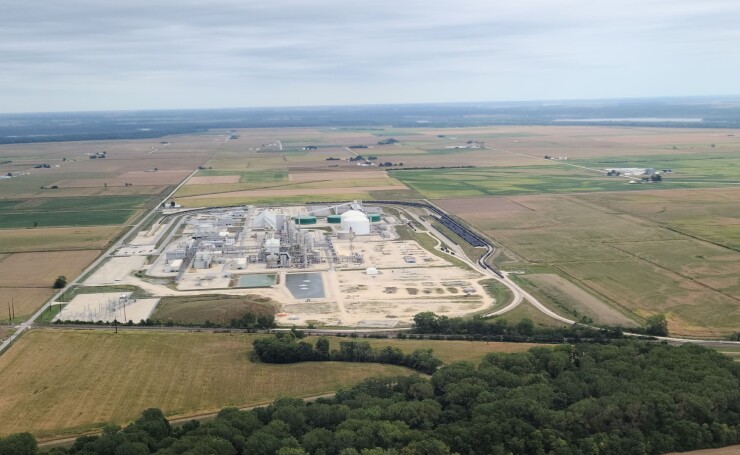The owner of a municipal-bond financed nitrogen fertilizer plant in Lee County, Iowa, is trying to sell the plant to one of its largest competitors, Koch Industries.
The Iowa Fertilizer Company plant was built from 2012 to 2017 near the unincorporated community of Wever. Helping to kick off construction were
The original speculative-grade debt that financed the plant

The IFCo bonds, issued by the Iowa Finance Authority, are
S&P Global Ratings in April 2022 assigned the revenue refunding bonds
The rating agency noted strong demand for fertilizer, tight supply and climbing feedstock prices, to which it attributed the higher prices for nitrogen fertilizers. Due to those market conditions, S&P predicted that OCI's adjusted funds from operations to debt ratio would climb to 130-140% compared to 52% the year prior.
Fitch Ratings likewise assigned the bonds a senior unsecured
A spokesperson for the Iowa Finance Authority referred all questions to the companies involved. Koch Industries did not respond to a request for comment.
An OCI representative said the principal outstanding on the IFCo bonds is $838.745 million. Asked about the guarantee backing the bonds, the representative said OCI has no plans to transfer the bonds to another OCI subsidiary before the sale closes. The OCI guarantee will disappear at closing if Koch decides to keep or defease the bonds. Koch may also choose to repay the bonds.
If Koch opts to keep the bonds, the bonds will stay with IFCo and may benefit from Koch's higher credit rating, the representative said.
Koch is rated AA-minus with a stable outlook by S&P Global Ratings and Aa3 with a stable outlook by Moody's Ratings.
Nothing about the pending sale is disclosed on the Municipal Securities Rulemaking Board's
OCI
The sale to Koch, which OCI plans to close sometime this year, has drawn criticism, particularly from the Iowa agriculture sector.
In a
Lehman said the administration of then-Gov. Terry Branstad — whose lieutenant governor, Kim Reynolds, took over for Branstad when he became ambassador to China in 2017 — had argued that public investment in the IFCo plant would "pay off for Iowa farmers for decades" by increasing competition among fertilizer producers.
Lehman did not respond to requests for comment. A spokesperson for Reynolds did not respond to requests for comment.
Lehman's group, which opposed the public subsidy for the plant, has joined 18 other agricultural and policy groups in urging federal regulators to block the upcoming sale.
Federal Trade Commission Chair Lina Khan
An FTC spokesperson said the FTC does not comment on pending mergers or acquisitions.
Iowa State Auditor Rob Sand has
The plant now has about 260 full-time employees.
When the bonds and public subsidies were being debated, Branstad said
In 2013, former Gov. Branstad
The state and local government incentives that lured OCI to Iowa included $96.5 million of Iowa Investment Tax Credits, which IFCo has not yet used; a 20-year property tax exemption from Lee County; Iowa sales tax refunds of $10.9 million; and the plant's bonds, issued through the Midwest Disaster Area Bond Program, which was passed after 2008 storms struck the Midwest.
To support recovery from the storms,
The program extended tax-exempt benefits to projects and developments that might otherwise not qualify under tax code rules.
The Iowa plant is one of two major fertilizer projects awarded financing through the Midwest disaster area bond program.
While the Iowa plant opened in 2017, the Midwest Fertilizer Company's project in Posey County, Indiana, appears to be in limbo. According to the
In the end, OCI invested roughly $2.5 billion in the Lee County plant, which cost over $3 billion to build.
"This deal is yet another example of the consequences of short-sighted public policy focusing only on imagined benefits and ignoring the pitfalls," the Iowa Farmers Union





